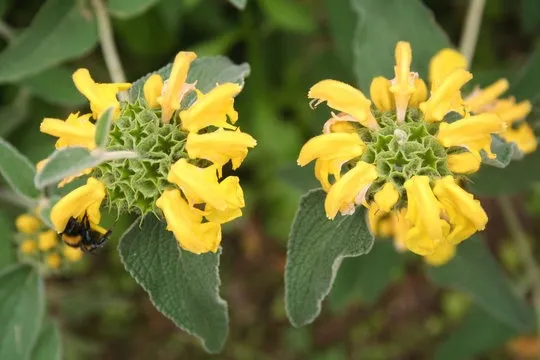Jerusalem Sage, also commonly referred to as the ‘Mediterranean Sage’ or ‘Wild Sage,’ is a native plant to the Mediterranean region, celebrated for its stunning appearance and versatile applications. With its silvery-green, aromatic leaves and enchanting whorls of bright, golden-yellow flowers, this Phlomis species adds a touch of warmth and sophistication to any garden or landscape.
Jerusalem sage is a shrubby evergreen in USDA Zones 8-10. Plants typically die to the ground in winter in USDA Zones 5, 6 and 7, with roots usually surviving. It is best grown in organically rich, fertile, medium moisture, well-drained soils in full sun. Plants tolerate some dry soils. Stems may be cut back after flowering to promote additional bloom.
Typical Uses:
- Garden Focal Point: Jerusalem Sage is an excellent choice for creating a focal point in your garden. Its tall, upright growth habit and vibrant blooms attract attention and provide an enticing visual contrast.
- Erosion Control: Its robust root system makes it ideal for planting on slopes or hillsides, effectively reducing soil erosion.
- Wildlife Attraction: Bees and butterflies adore the nectar-rich flowers, making it a valuable addition for pollinators and biodiversity.
- Herbal Uses: In addition to its ornamental qualities, the leaves of the Jerusalem Sage have been used traditionally in herbal remedies for their potential medicinal benefits.
Establishment and Care Instructions:
- Location: Plant your Jerusalem Sage in a sunny spot where it can receive at least 6 hours of direct sunlight per day.
- Soil: Well-drained soil is crucial for the health of your plant. Phlomis Fruticosa thrives in slightly alkaline and sandy soils.
- Watering: Once established, this drought-tolerant shrub requires minimal watering. It’s best to let the soil dry out between watering sessions.
- Pruning: Prune in late winter or early spring to maintain its shape and encourage new growth.
- Fertilization: Fertilize sparingly, as this sage prefers lean soils. Apply a balanced, slow-release fertilizer in the spring.
Special Features and Usage:
- Aromatic Leaves: The leaves of Jerusalem Sage emit a pleasant herbal fragrance when crushed, adding to the sensory appeal of your garden.
- Drought Tolerance: With its remarkable ability to thrive in dry conditions, this plant is perfect for water-wise gardening.
- Unique Aesthetic: The golden-yellow whorls of flowers are a rare and captivating sight, providing a pop of color against the silver-green foliage.
- Historical Significance: Jerusalem Sage has a rich history of use in traditional medicine and has been revered for its various herbal applications.

Reviews
There are no reviews yet.